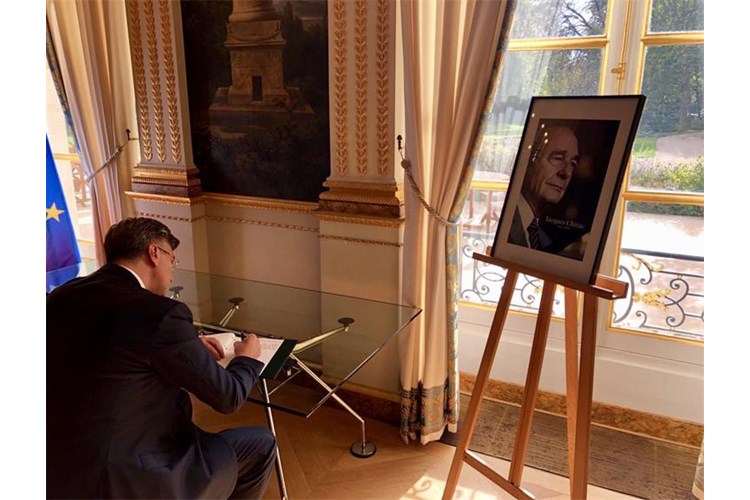


"(Chirac) did very much for France and Europe, but we can freely say that he had a global role as well and in his work he always underlined the values of the Republic: freedom, democracy, fraternity and solidarity," Plenkovic told reporters.
He went on to say that Chirac was one of the most loved presidents and a man who was a statesman, brilliant politician and prime minister as well as two-time president.
"He was especially known for solidarity, he was a man who in the political sense fought against exclusion (...) Today France and Europe and the entire world bid farewell to a great statesman," Plenkovic said.
The Croatian PM recalled Chirac's attendance of a 2000 summit in Zagreb, noting that that act was very important for Croatia's European journey.
"He later supported us in our activities on the journey towards NATO and the EU and we came here because we appreciate his contribution and because we nurture good relations with France," said the PM.
Plenkovic said that at the lunch at the Élysée Palace he had a lot of opportunity for contacts and promotion of relations, saying that efforts were being made to organise President Macron's visit to Croatia in a foreseeable time.
"... we believe that it would be very good and useful, notably in the context of Croatia's coming chairmanship of the Council of the EU," Plenkovic said, adding, "We just have to coordinate our schedules."
He described relations with France as very good, saying that their dialogue "is full of respect and trust."
"Our relations are very good, and we have dialogue on all issues, European, security, global, regarding the situation in Southeast Europe," said the PM, underlining that economic cooperation and trade had to be constantly promoted.
Aside from Plenkovic, the commemoration for the late former French president was attended by numerous current and former world leaders, including Russian President Vladimir Putin, Italian President Sergio Mattarella, German President Frank-Walter Steinmeier, Belgian Prime Minister Charles Michel, Lebanese PM Saad Hariri and Hungarian PM Viktor Orban, former US President Bill Clinton, former German Chancellor Gerhard Schroeder and many others.
Chirac, who died at 87, was the President of France for 12 years (1995-2007), and between 1977 and 1995 he was the Mayor of Paris.
During his term as president France joined the euro area.
Croatian analysts agree that Chirac was very important to Croatia. He started his first term in office in May 1995, only three months before Operation Storm, which eventually ended the five-year-long Serb armed insurgency in Croatia. He broke the pro-Serbian policy of his predecessor Francois Mitterand, who said in response to calls for France to do something to stop Slobodan Milosevic that the French soldier would never shoot at the Serbian soldier.
When Bosnian Serb troops under Ratko Mladic took French UN peacekeepers prisoner, Chirac responded resolutely and France took part in NATO air strikes against Serb military targets in Bosnia and Herzegovina and later in a bombing campaign on Belgrade. With a changed, more balanced policy, France became a force of peace in the territory of former Yugoslavia, analysts say.
The Dayton peace agreement was signed at the Élysée Palace, with Chirac as the host.
Chirac was the last French president to visit Croatia. He did so in 2000 to participate in an EU-Western Balkans summit in Zagreb. As the President of the European Council, together with the then Croatian President Stjepan Mesic and European Commission President Romano Prodi, he chaired the summit between the EU and Albania, Macedonia, Croatia, Bosnia and Herzegovina, the Federal Republic of Yugoslavia (Serbia and Montenegro) and Slovenia, emphasising EU membership prospects for these countries.
In the summer of 1991, as Mayor of Paris, in the City Hall he received the then Croatian President Franjo Tudjman who had previously had rather difficult talks with Mitterand on the crisis of the Yugoslav federation.
Internationally, Chirac will be remembered for his strong opposition to the 2003 US-led invasion of Iraq without a UN mandate. In France, he will be remembered as the first politician to admit the responsibility of the state for deportations of Jews to Nazi death camps during World War II.
Text: Hina